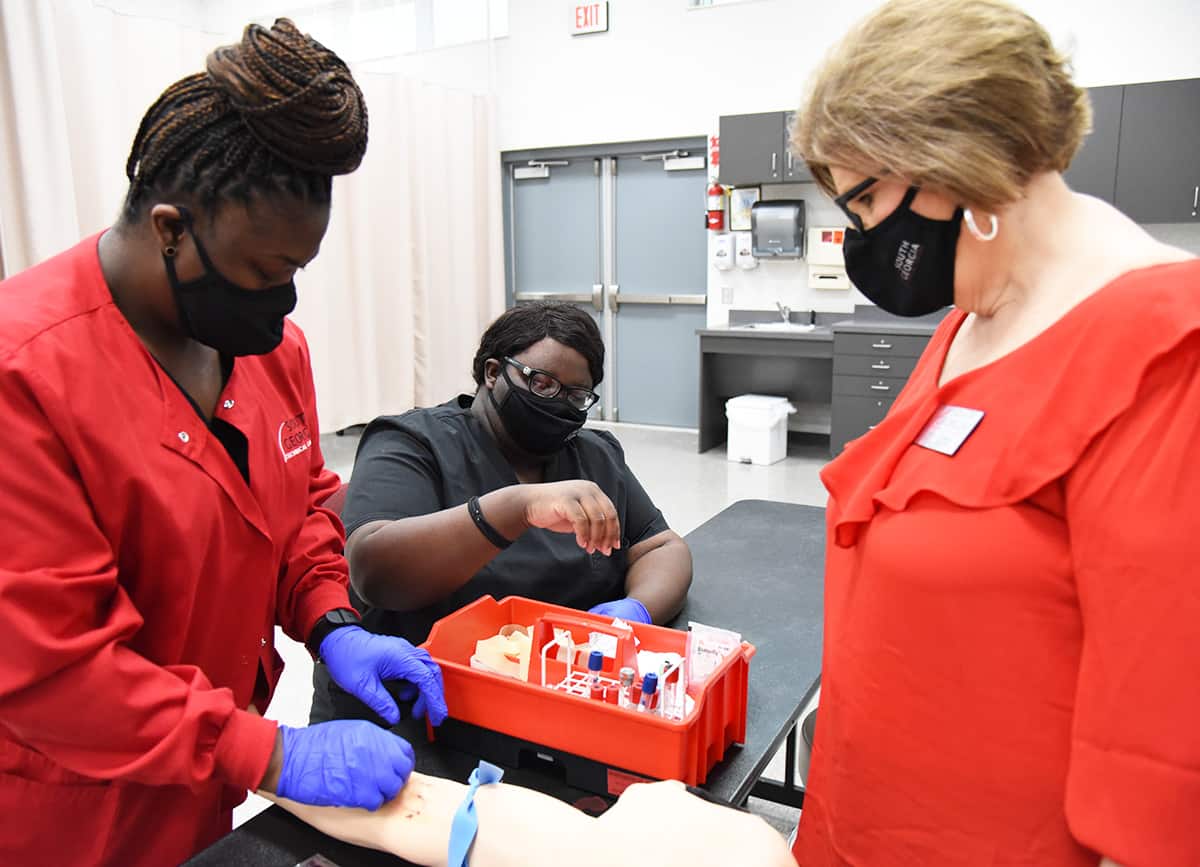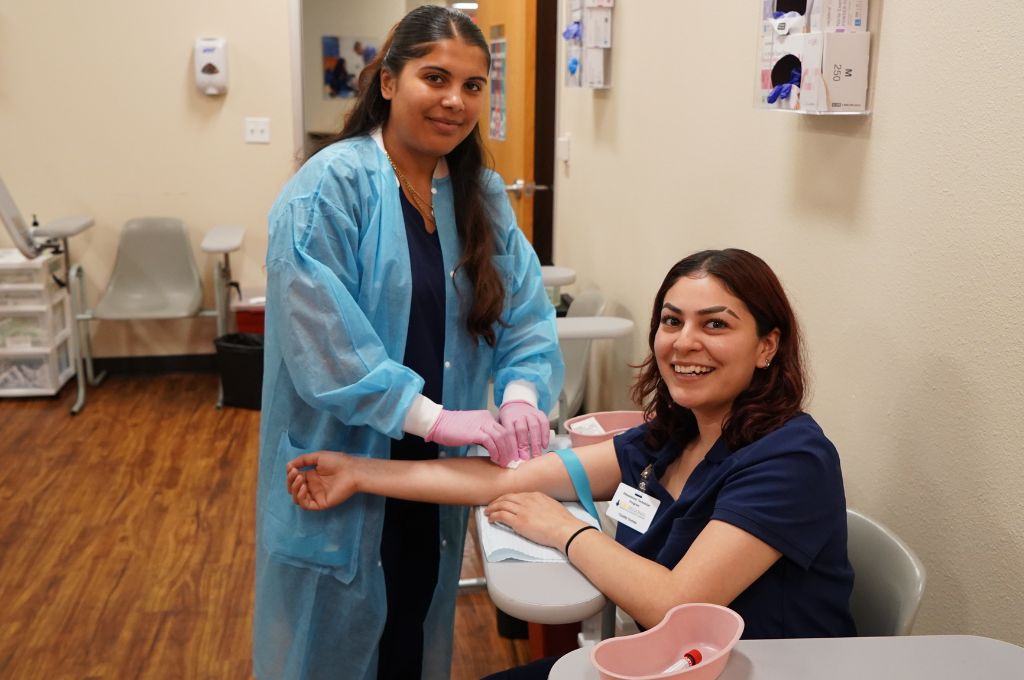The Course to Accreditation: Comprehending the Phlebotomy Training Program Journey and Its Importance
As you think about the course to qualification in phlebotomy, it is very important to recognize the duty you'll play in health care. Your training will certainly cover necessary skills, from blood collection methods to patient communication. Each part of the program prepares you for the obstacles ahead. What specifically does the trip involve, and why is certification so vital for your future profession? Allow's discover these concerns further.

The Role of Phlebotomists in Healthcare
Phlebotomists play an important role in the healthcare system, acting as the essential web link in between people and crucial diagnostic screening. You'll do blood draws, ensuring examples are collected accurately and securely. Your proficiency helps in identifying medical problems, checking health and wellness, and guiding treatment choices.
In your everyday communications, you'll need to establish trust fund with patients, making them really feel comfortable during what could be a stressful experience. You are accountable for identifying and taking care of samples carefully to stop contamination or errors, which could impact test results.
Past this, you'll usually function alongside medical professionals and nurses, interacting crucial info concerning clients' problems. By mastering your abilities, you contribute meaningfully to individual treatment, making you a crucial component of the clinical group.
Summary of Phlebotomy Training Programs
When checking out phlebotomy training programs, you'll discover different types made to fit different timetables and learning styles. Each program assists you establish crucial skills like blood collection and person communication. Recognizing these alternatives is essential to choosing the right course for your career.
Sorts Of Training Programs
A number of kinds of training programs are offered for those aiming to end up being skilled in phlebotomy. You can select from certification programs, which normally last a few months and concentrate on necessary skills. There are likewise diploma programs that give a more comprehensive education and learning, commonly lasting as much as a year. If you're seeking a deeper understanding, an associate level in a related area could be the best fit. On-line courses provide flexibility for those stabilizing job or family commitments, enabling you to examine at your very own pace. Furthermore, some medical facilities and centers provide on-the-job training programs, supplying functional experience while you discover. Whatever path you pick, each program aims to furnish you with the required skills for a successful phlebotomy profession.

Trick Skills Established
Understanding phlebotomy calls for a set of key skills that are established via complete training programs. Additionally, interaction skills are fundamental; you'll need to communicate with individuals, clarify procedures, and put them at simplicity. Each of these skills is crucial for your success as a certified phlebotomist, making you a beneficial property in any kind of medical care setting.
Secret Components of a Phlebotomy Course
In a phlebotomy training course, you'll concentrate on essential topics that prepared for your future occupation. You'll participate in hands-on training that permits you to apply what you have actually found out in real-world settings. Both the curriculum and practical experience are crucial for your success as a phlebotomist.
Curriculum Introduction
While pursuing a phlebotomy training course, you'll experience a core educational program created to equip you with fundamental skills and knowledge. Phlebotomy Training Course. This curriculum normally consists of makeup and physiology, focusing on the circulatory system and recognizing blood components. You'll likewise find out about different kinds of blood collection methods, including venipuncture and capillary puncture techniques
Furthermore, infection control and safety procedures are crucial elements, ensuring you recognize exactly how to keep a sterile atmosphere. You'll research patient interaction, emphasizing interaction and empathy, which are vital for alleviating person anxiety.
Hands-On Training Experience
Getting hands-on experience is an important component of your phlebotomy training program. This practical training enables you to use what you have actually found out in a real-world setup, boosting your skills and confidence. You'll practice venipuncture strategies, learn just how to manage different kinds of samplings, and obtain aware of the devices made use of in the area. Under the advice of experienced instructors, you'll refine your abilities, ensuring you're prepared for any kind of situation you may face.
Additionally, you'll get the opportunity to engage with people, which is important for developing your communication skills. This combination of technical effectiveness and social skills is crucial for your success as a certified phlebotomist. Eventually, hands-on training is where concept meets technique, strengthening your understanding and preparedness for qualification.
Qualification and Licensing Needs
Before you can begin your job in phlebotomy, it is essential to recognize the qualification and licensing requirements that differ by state. The majority of states call for phlebotomists to hold a certification from an identified organization, such as the National Phlebotomy Association or the American Society for Clinical Pathology. These qualifications commonly include passing an exam that evaluates your understanding and abilities in the field.
Along with qualification, some states have certain licensing needs. You may require to complete a specific variety of hours in scientific technique, send proof of training, or undergo a history check. It is essential to research your state's regulations to make certain you fulfill all necessary standards.
Staying notified regarding these needs not just helps you secure a setting yet also enhances your reputation as a professional. By satisfying these demands, you'll be well on This Site your method to an effective occupation in phlebotomy.
Hands-On Training and Practical Experience
Hands-on training and useful experience are important components of your phlebotomy education, as they enable you to apply academic knowledge in real-world situations. During your training, you'll participate in supervised venipuncture, discover appropriate techniques, and come to be aware of numerous blood collection devices. This straight involvement is critical for constructing your confidence and developing your abilities.
You'll work carefully with experienced specialists who can lead you through the subtleties of individual communication and example handling. Each session not just strengthens your understanding yet additionally prepares you for the fast-paced environment of health care settings.
Additionally, several programs include scientific rotations, enabling you to experience diverse settings, from healthcare facilities to outpatient facilities. This exposure helps you adjust to various difficulties and individual requirements, ensuring you're well-prepared for your future duty. Embrace these opportunities, as they're necessary to ending up being a skilled and caring phlebotomist.
Challenges Encountered During Training
While gaining hands-on experience is important, it's important to acknowledge the difficulties that can emerge during your phlebotomy training. Furthermore, understanding the abilities needed for blood draws takes practice; you might battle with technique initially.
Time monitoring can additionally be a hurdle, as balancing theory, functional sessions, and individual dedications can feel intimidating. You may encounter differing finding out rates amongst your peers, bring about sensations of self-doubt if you believe you're falling behind. Adapting to the different characters of teachers check here can be tough, as each may have an unique training style.
Acknowledging these obstacles beforehand can prepare you for success and help you establish strength throughout your training trip.
Job Opportunities After Qualification

As you obtain experience, you may even consider specializing in areas like pediatric or senior citizen phlebotomy, satisfying details patient needs. Some phlebotomists choose to progress their careers by coming to be research laboratory specialists or pursuing more education in health care areas.
Furthermore, your accreditation can lead to duties in training or overseeing new phlebotomists, enabling you to share your knowledge. With the healthcare market constantly expanding, your abilities will constantly be in need, leading the way for a steady and satisfying job. Accept the possibilities waiting on you!
Regularly Asked Concerns
What Is the Normal Duration of a Phlebotomy Training Training Course?
Phlebotomy training courses commonly last around four to eight weeks. You'll take part in hands-on practice, classroom instruction, and online knowing. Completing this training prepares you for qualification and a gratifying profession in health care.
Are Online Phlebotomy Courses Available?
Yes, online phlebotomy training courses are available. They supply versatility and comfort, allowing you to study at your very own rate. Simply verify the program is recognized to meet qualification demands and get useful abilities for your profession.
Just How Much Does Phlebotomy Training Generally Expense?
Phlebotomy training usually costs in between $700 and $2,500, relying on the program and area. You must consider variables like training course length, included materials, and hands-on experience when selecting from this source the right training for you.
What Are Common Prerequisites for Phlebotomy Training?
Typical prerequisites for phlebotomy training commonly consist of a secondary school diploma or GED, immunizations, and a background check. Some programs may likewise call for standard health care expertise or certifications, ensuring you're planned for hands-on training.
Can I Function While Completing My Phlebotomy Training?
Yes, you can work while finishing your phlebotomy training. Several pupils equilibrium tasks with their studies, but make specific to manage your time successfully to assure you satisfy both work and training commitments successfully.